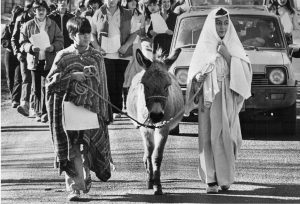When examining American music, it is clear to see that no musical tradition has come about without the fusion of many cultural properties. This ceaseless blending and creation is what we ought to thank for the multiplicity of beautiful and unique music that has come out of the Americas. However, such musical synthesis frequently leads to questions about the injustices and power struggles that led to the development of new musical traditions. In addition, we often also consider how these musical styles give voice to historically oppressed people today and whether this art can be a medium through which justice might be sought. The cultural, religious, and musical tradition known as ‘Las Posadas’ is an example of such cultural blending that has its earliest roots in the first attempts to Christianize the Aztecs in the early sixteenth century. As an ever-morphing ritual with centuries worth of history, Las Posadas serves as an example of how cultural amalgamation forces us to ask questions about historical and present inter-ethnic transgression.
The tradition of Las Posadas occurs annually in the American Southwest and is a celebration of the birth of Jesus Christ. Las Posadas (“the inns”) refers more directly to Mary and Joseph’s search for lodging prior to the incarnation. During each night of this nine-day Catholic devotion, two individuals play the roles of Mary and Jospeh and ask various members of their community for lodging. They are denied a place to rest each night, and are sent on their way. This nightly ritual is accompanied by posada songs, music specific to this ritual. One of the primary songs for this event is simply titled “Las Posadas” in which Joseph asks the innkeepers for a place to stay for the night.
While this tradition is a beautiful example of cultural blending in the United States, it has its roots in the colonization that occurred early on in the development of the New World. The history of this music and tradition begins in the early sixteenth century when Augustine priests attempted to christianize the Aztecs. By coincidence, the Aztec people celebrated the birth of their god Huitzilopochtli at approximately the same time as Christmas. The overlapping religious events made it easier for the Augustinians to convert the population, and out of this conversion came the traditions and music that is now referred to as Las Posadas. Today, many connections have been drawn between Mary and Joseph’s search for a home and ultimate rejection to the on going issue of immigration in the United States. In 2002 at the Posada sin Fronteras event in San Diego, California, alternate lyrics to the Las Posadas song were composed to demonstrate the similarity in relationships between the Holy parents and the innkeepers along with immigrants and border officals. By recognizing and connecting the power struggles of the past to those which are still ongoing, this art which once was used as a means to overpower or dehumanize becomes a medium for protest and vehicle for change.
There is much to be learned about the tradition of Las Posadas and the multiplicity of meanings imbedded in this ritual. While there is a significant amount of cultural dissonance within this music and its history, there is just as much hope to had for its in its performance and reinvention.
Cantos de Las Posadas and Other Christmas Songs (recorded by Elena Paz and Carlos Garcia Travesi). Performed by Suni Paz, and C. G. Travesi., Folkways Records. Alexander Street, https://search.alexanderstreet.com/view/work/bibliographic_entity%7Crecorded_cd%7C72362.
“Las Posadas Student Procession.” The American Mosaic: The Latino American Experience, ABC-CLIO, 2022, latinoamerican2.abc-clio.com/Search/Display/1922421. Accessed 3 Oct. 2022.
“Traditional Las Posadas Song.” The American Mosaic: The Latino American Experience, ABC-CLIO, 2022, latinoamerican2.abc-clio.com/Search/Display/1839445. Accessed 3 Oct. 2022.
De La Torre, Miguel A. “A Colonized Christmas Story.” Interpretation (Richmond), vol. 71, no. 4, 2017, pp. 408–17, https://doi.org/10.1177/0020964317716131.
Nolan, Seth. “Las Posadas.” The American Mosaic: The Latino American Experience, ABC-CLIO, 2022, latinoamerican2.abc-clio.com/Search/Display/1329879. Accessed 3 Oct. 2022.
Hondagneu-Sotelo, P., et al. “‘There’s a Spirit That Transcends the Border’: Faith, Ritual, and Postnational Protest at the U.S.-Mexico Border.” Sociological Perspectives, vol. 47, no. 2, 2004, pp. 133–59, https://doi.org/10.1525/sop.2004.47.2.133.

